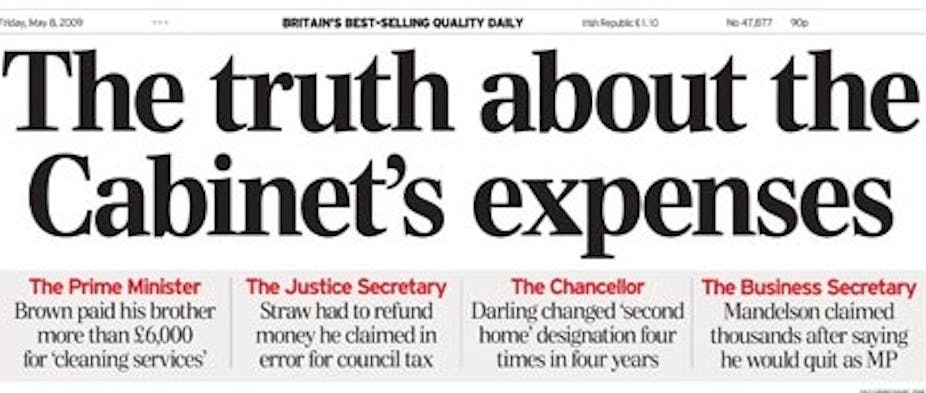A Freedom of Information request lodged on a quiet news day by a journalist has revealed that more than 800 police officers in England and Wales have been investigated for breaching social media guidelines over the past five years.
Quite apart from showing us that the police, like many other public bodies, find it difficult to control what its members do on Twitter, the story raises the importance of the Freedom of Information Act, which comes under regular fire for, according to the prime minister, David Cameron: “furring up the arteries” of government.
The Local Government Association recently published a list of ten “silly” FoI requests. While not arguing that all such requests are like this, the implied point is that FoI is being “abused”.
This complaint mirrors the comments of Tony Blair in his memoirs:
The truth is that the FoI Act isn’t used, for the most part, by ‘the people’. It’s used by journalists. For political leaders, it’s like saying to someone who is hitting you over the head with a stick: ‘Hey, try this instead’ and handing them a mallet. The information is neither sought because the journalist is curious to know, nor given to bestow knowledge on ‘the people’. It’s used as a weapon.
It also fits with concerns from a stream of other ministers and officials that FoI stops records being created and hampers decision-making. It is likely to feed into the recent government announcement of a consultation on whether the act is, indeed, being abused.
Little is known about FoI requesters. The pattern appears to be broadly that a variety of people and groups use it for a whole variety of reasons. Most FoI requests go to local government, the largest user group (contrary to Blair’s claim) are the public and, high-profile cases aside, many use FoI for “micro-political” issues, such as dealing with a pothole or planning application.
As a response to the list, I’d like to offer my own list of ten serious issues revealed by FOI requests.
- Extraordinary rendition – the UK’s involvement was revealed by FoI requests from the All-Party Group.
- Details of the Universal Credit welfare reforms.
- The Libor banking scandal and knowledge of it.
- Lists of visitors to the prime ministerial residence at Chequers (and ministerial meetings and diaries now proactively released).
- The use (and, it turned out, abuse) of passes to parliament.
- Creation of the famous “Weapons of Mass Destruction” dossier.
- The monarch’s involvement in vetoing legislation.
- The results of local restaurant hygiene inspections that helped create http://www.scoresonthedoors.org.uk/.
- The salaries of senior academics and NHS officials.
- The planned closure of local libraries up and down the country.
Keeping them honest
Underneath these high-profile cases, our research found a steady stream of accountability stories over planning, car parking and many other issues – just see David Higgerson’s FOI Friday.

The act also helped create IPSA, which regulate MPs’ expenses, led to a change in the law so all members of the House of Lords pay tax in the UK and drove the regular publishing of local government salaries.
This not to say there aren’t “silly” requests, from dragons to zombie attacks (though “silly” is subjective as Jonathan Baines explains, many corruption scandals have been triggered by apparently pointless questions or the piecing together of small bits of information).
Nor is it to claim the act is not taken advantage of – in the UK, and even more in the US, FoI has led to heavy use by business – see this particularly controversial case in Scotland with Phillip Morris seeking access to details of a study of underage smoking.
Yet such requests represent only a minority of the estimated 253,000 requests per year (my own estimates based on the most recent figures for numbers of local government requests in 2010 (192,000) plus the number of requests to central government in 2013 (53,000). On the whole, research indicates that FoI is composed of all sorts of questions, on all sorts of topics, sent in by all sorts of people and groups.
It is this unpredictability that helps make it effective. One local politician told me: “you never know what you will get asked”. The presence of FoI, the possibility of a question, can make someone think twice and even deter them from corrupt or inappropriate behaviour.
There is also an issue of democratic principle. The right to information, championed by radicals such as the Levellers and Diggers centuries ago, means the right to ask questions (to misquote Orwell on liberty) that the powerful may not want you to ask.
It is a democratic right to ask and this may mean some silliness – just as voting may mean non-voting or “silly” voting. Like all parts of a democracy, it is messy and unpredictable and can occasionally go wrong. But in its messiness and unpredictability lies its power.

